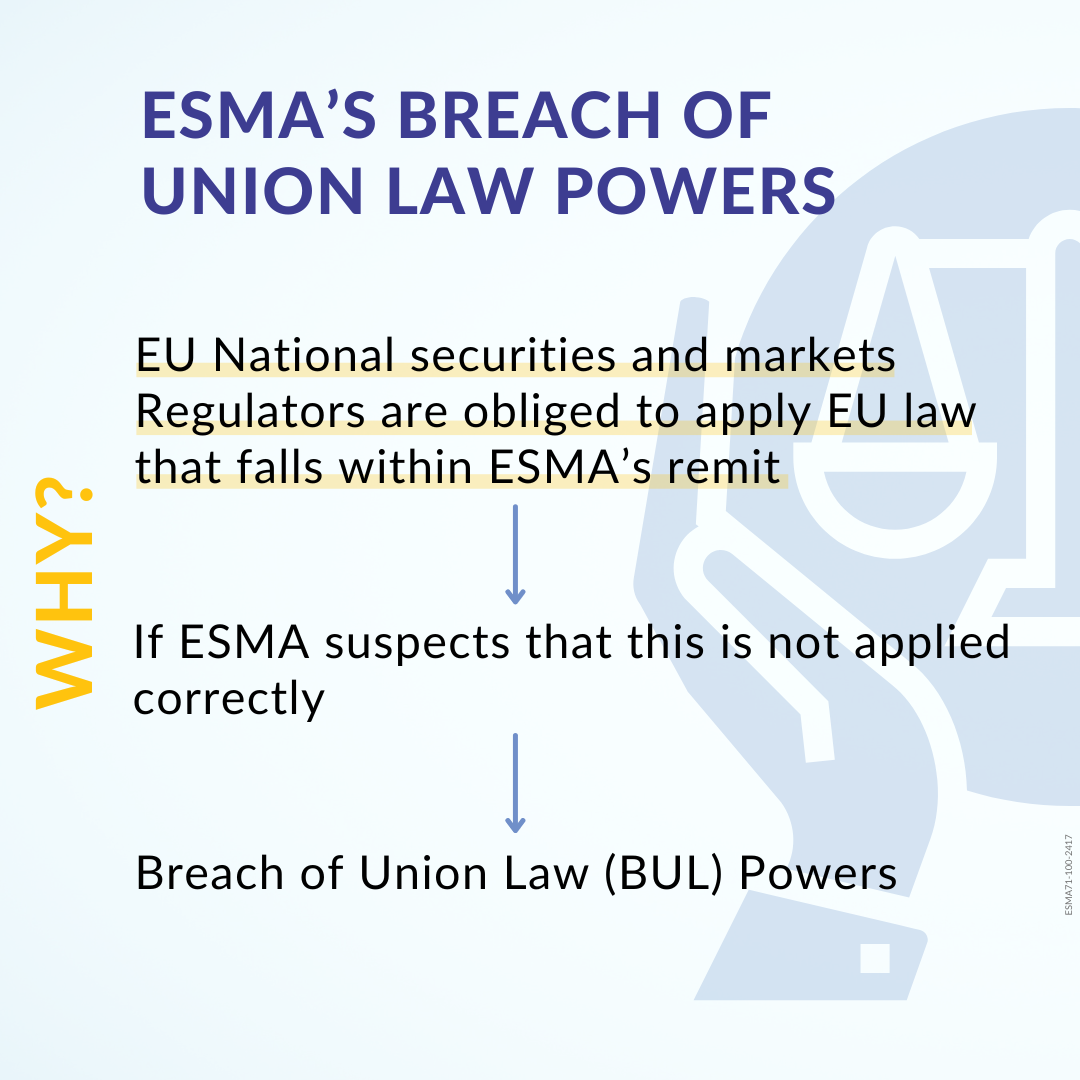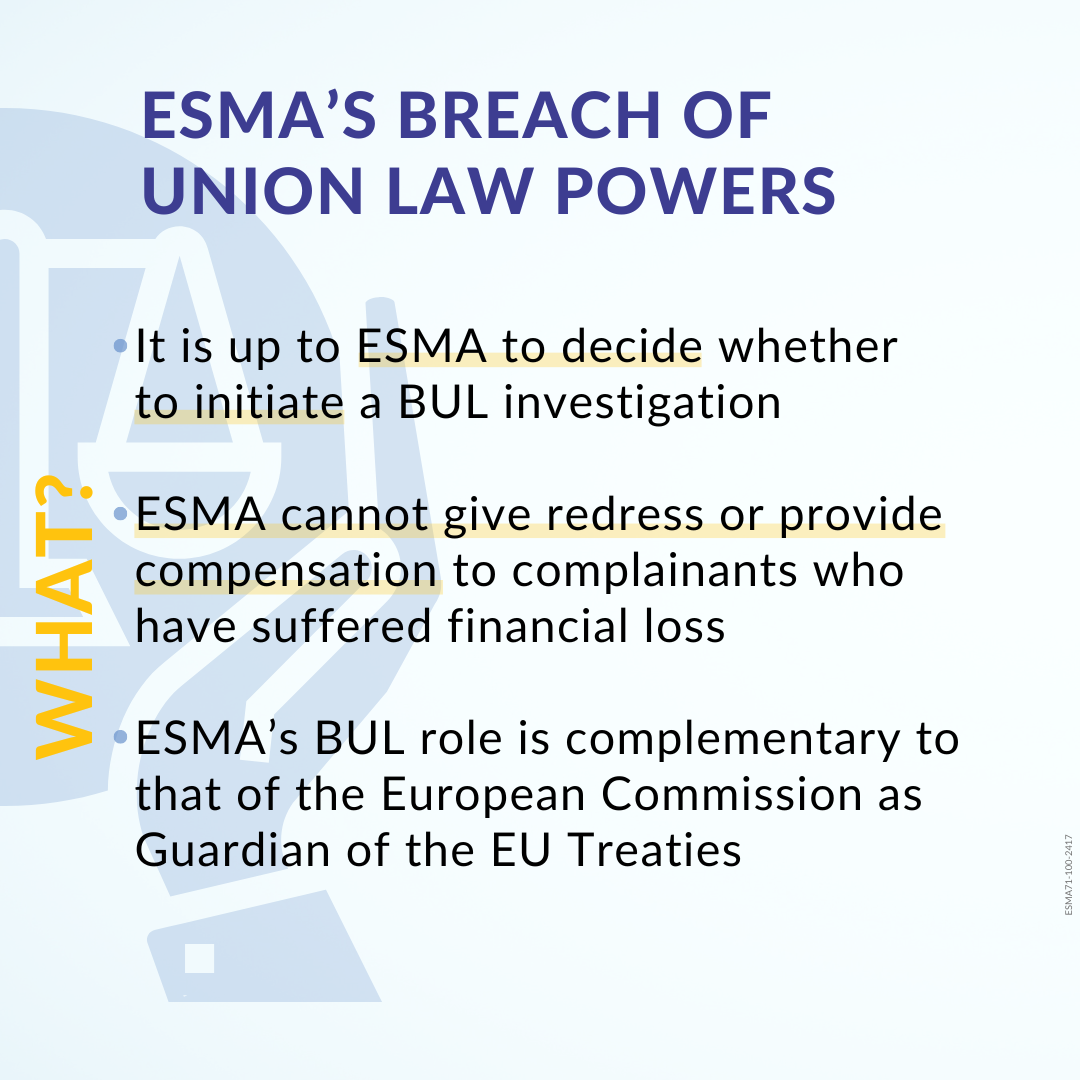Breach of Union Law
ESMA has power under Article 17 of the ESMA Regulation (EU Regulation No 1095/2010) to investigate and take further action concerning the failure of National Competent Authorities to comply with their obligations under the legislation referred to in Article 1(2) of the ESMA Regulation.
▸ Find out more about ESMA’s breach of Union law process in the visuals.
ESMA’s BUL powers
It is important to bear in mind that ESMA’s power is limited to the investigation of national regulators (referred to as National Competent Authorities). The aim of an investigation under Article 17 is a general one, i.e., to ensure that the practices of NCAs are brought fully into line with the EU law under ESMA’s remit; it is not to address the grievances of individual investors vis-à-vis financial market participants.
To directly resolve your personal situation, or to seek monetary compensation, you should therefore take action locally, in the Member State concerned.
We also recommend that you consult ESMA’s Rules of procedure on breach of Union law investigations.
The procedure for the assessment of whether to initiate an investigation under Article 17 and the conduct of such an investigation are both provided for in these rules of procedure.
Please take note of the following in relation to the procedure under Article 17 of ESMA Regulation:
- In order for a request to be deemed admissible, it must set out a clear grievance explaining how a competent authority has not applied the acts referred to in Article 1(2) of the ESMA Regulation, or has applied them in a way which appears to be a breach of Union law, including the technical standards established in accordance with Articles 10 to 15, in particular a failure of a competent authority to ensure that a financial market participant satisfies the requirements laid down in those acts;
- A request could be deemed inadmissible if:
- It is not written in one of the official languages of the Union;
- it is clearly unsubstantiated;
- it is frivolous or vexatious;
- it fails to set out a grievance;
- it sets out a grievance which is outside the scope of the acts referred to in Article 1(2) of the Regulation;
- it fails to refer, explicitly or implicitly, to a competent authority to which the alleged breach of Union law may be attributed;
- it concerns the acts or omissions of a private person or body, unless the request reveals the involvement of competent authorities or alleges their failure to act in response to those acts or omissions; and / or
- it sets out a grievance which is materially the same as one for which ESMA has already informed the Requester of its position or has adopted a clear, public and consistent position.
- Only if ESMA determines that a request is admissible, it can initiate an investigation.
What this means is that the circumstances in which a complaint will be found admissible are strictly limited.
Further, even admissible complaints may not lead to the opening of an investigation if, for example, the Request is more suitable to be dealt with by another person or body, such as another European Supervisory Authority (e.g., the European Banking Authority), a national competent authority, a national complaints scheme or a court, or such other entity is already dealing with the complaint or has already dealt with it.
More information on positive and negative investigation factors can be found in Annex II of ESMA’s Rules of procedure on breach of Union law investigations.
How to send a complaint to ESMA?
Before sending a complaint to ESMA you may wish to ensure that there are no better means of addressing your grievance (such as a complaint to a national competent authority or an ombudsman, or legal action in your national court system). It may be helpful to consult the Your Europe Advice platform.
In order for ESMA to understand your complaint and to be able to assess its admissibility, you must submit your complaint using the complaint form linked below. You can submit your complaint in any official EU language. Complaints sent by any other means or without using the form will not be considered. If you do not use the form, you will be asked to resubmit your complaint. Please make sure you include the following details:
- describe exactly how you believe that a national competent authority has infringed Union law, and which is the Union law that you believe they have infringed
- give details of any steps you have already taken to obtain redress.
If you decide to submit the form, please note that ESMA’s action in response to complaints is unlikely to resolve your personal situation directly because:
- ESMA is not obliged to open an investigation under Article 17 of the ESMA Regulation – even if it considers a breach has occurred.
- If ESMA does formally follow up your complaint, its aim is a general one – to ensure that, going forward, the practices of the concerned NCAs are brought fully into line with Union law.
If solving your problem requires a national decision to be annulled, only national courts can do this, and if you are seeking compensation for damage, only national courts have the power to order authorities in their jurisdiction to award this.
To directly resolve your personal situation, or to seek monetary compensation, you should therefore take action locally, in the Member State concerned.
Confidentiality
Pursuant to Article 17a(3) of ESMA Regulation, the request to investigate a competent authority and information attached to the request may be submitted anonymously or confidentially. When such information is submitted anonymously or confidentially, ESMA processes it in accordance with the applicable professional secrecy rules.
When submitting the complaint form, you will have the opportunity to indicate whether you authorise ESMA to disclose your identity in its contacts with the national authorities against which the complaint is submitted.
 Breach of union law complaint form (All EU official languages)
Breach of union law complaint form (All EU official languages)


